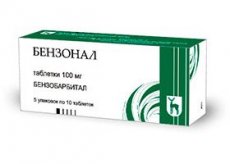Medical expert of the article
New publications
Preparations
Benzobarbital
Last reviewed: 03.07.2025

All iLive content is medically reviewed or fact checked to ensure as much factual accuracy as possible.
We have strict sourcing guidelines and only link to reputable media sites, academic research institutions and, whenever possible, medically peer reviewed studies. Note that the numbers in parentheses ([1], [2], etc.) are clickable links to these studies.
If you feel that any of our content is inaccurate, out-of-date, or otherwise questionable, please select it and press Ctrl + Enter.

Indications Benzobarbital
Among the indications of the drug:
- epilepsy in convulsive forms, having various origins (especially if the focus of pathology is localized in the cerebral cortex);
- seizures of polymorphic or non-convulsive type (taken in combination with other antiepileptic drugs);
- functional forms of hyperbilirubinemia (including those developing after hepatitis);
- Gilbert's syndrome;
- chronic stage of hepatitis in cholestatic form;
- a benign form of recurrent cholestasis developing inside the liver;
- suprahepatic jaundice.
Release form
It is produced in tablet form. The volume of tablets for adults is 0.1 g, and for children's tablets - 0.05 g. One blister contains 10 tablets, in a package - 5 blister plates.
 [ 10 ]
[ 10 ]
Pharmacodynamics
The drug helps reduce the frequency of epileptic seizures. In addition, it increases the activity of the microsomal system of liver enzymes and the processes of glucuronidation with acetylation. The drug also accelerates the process of biotransformation of external and internal compounds, including bilirubin.
 [ 11 ]
[ 11 ]
Pharmacokinetics
During the metabolism process, the substance phenobarbital is formed, which has antiepileptic properties. Synthesis with proteins inside the plasma is quite weak.
The drug is found in high concentrations in the kidneys with liver and brain. It passes through histohematic barriers and also penetrates into mother's milk. The half-life is 3-4 hours.
Excretion occurs through the kidneys, the substance is excreted unchanged, as well as in the form of decay products.
Dosing and administration
The medicine should be taken orally after meals. Dosages are selected depending on the regularity and nature of the attacks, as well as the patient's age.
Adults - 0.1 g three times a day (the maximum daily dosage is 0.8 g), children (also three times a day): in the age category of 3-6 years - 0.025-0.05 g, in the period of 7-10 years - 0.05-0.1 g, at the age of 11-14 years - 0.1 g (no more than 0.45 g per day).
The treatment course begins with a single dose of a single dosage, and then, after 2-3 days, the daily dose is gradually increased to the optimal level. The duration of drug use in a maintenance dosage is individual and depends on the therapeutic effectiveness of the drug. It is recommended to take the tablets for at least 2 years (even if the attacks have already stopped).
To eliminate hyperbilirubinemia, you should take tablets for 2-3 weeks in the same dosages that are prescribed for the treatment of epilepsy.
Use Benzobarbital during pregnancy
The use of Benzobarbital is contraindicated during pregnancy.
Contraindications
Among the contraindications:
- severe liver or kidney dysfunction;
- 2-3 stage of chronic heart failure;
- the presence of bronchial asthma, anemia, diabetes mellitus, porphyria, and also adrenal or respiratory failure;
- development of depression (with suicide attempts), hyperkinesis;
- intolerance to the component benzobarbital.
 [ 16 ]
[ 16 ]
Overdose
A sign of a drug overdose is an increase in its side effects.
To eliminate the disorders, it is necessary to perform gastric lavage, give the patient activated charcoal, and then carry out treatment aimed at getting rid of the symptoms.
 [ 21 ]
[ 21 ]
Interactions with other drugs
The drug increases the effect of antipsychotics, tricyclics, sleeping pills, narcotic analgesics, anesthetics, and also ethyl alcohol and tranquilizers.
As a result of combined use with Benzobarbital, the effectiveness of tetracycline drugs, paracetamol, GCS, xanthines, anticoagulants, mineralocorticosteroids, griseofulvin, quinidine, as well as cardiac glycosides and calciferol decreases.
Combined use with drugs that have myelosuppressive properties causes an increase in the hematotoxic effect.
 [ 22 ]
[ 22 ]
Storage conditions
The medicine must be kept in a place with standard conditions for medicines. Temperature – no more than 25°C.
 [ 23 ]
[ 23 ]
Attention!
To simplify the perception of information, this instruction for use of the drug "Benzobarbital" translated and presented in a special form on the basis of the official instructions for medical use of the drug. Before use read the annotation that came directly to medicines.
Description provided for informational purposes and is not a guide to self-healing. The need for this drug, the purpose of the treatment regimen, methods and dose of the drug is determined solely by the attending physician. Self-medication is dangerous for your health.

